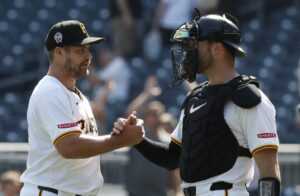This past week, Major League Baseball finally reached a verdict on the suspension for Toronto Blue Jays closer Roberto Osuna. On May 8th, Osuna was arrested and charged for an alleged domestic assault on his girlfriend, which caused her to be hospitalized.
After a lengthy discussion, MLB Commissioner Robert Manfred laid down a 75-game suspension without pay, which Osuna accepted.
Although the MLB and its Players’ Association agreed upon a policy that allows the league to investigate allegations of domestic violence and sexual assault, Osuna’s suspension does nothing to deter this criminal action. It is merely a slap on the wrist for an athlete with celebrity status, while survivors of domestic violence are left to suffer in silence as they wait to receive the justice they deserve.
The Twisted Relationship Between the MLB and Domestic Violence
Before the MLB’s policy was implemented, scandals involving athletes and domestic violence were brushed under the rug and not revealed to the public. But in the age of the “Me Too” movement, more survivors are coming forward, revealing their stories of being sexually harassed or assaulted.
In the years preceding the policy, Major League Baseball has had a dark history with domestic violence. In 1997, Boston Red Sox outfielder Will Cordero was arrested for domestic violence after allegedly beating up his wife. While Cordero received a 90-day suspension with mandatory counseling, the Red Sox only suspended him only eight games.
In 2000, former Colorado Rockies pitcher Pedro Astacio pled guilty to acts of domestic violence. The Rockies and Commissioner’s Office gave him no suspension, and Astacio went on to start for the team that season, pitching 32 games.
In 2005, police visited Los Angeles Dodgers outfielder Milton Bradley numerous times, as a result of domestic violence complaints. Yet no charges were formally filed. That season, the Dodgers would nominate Bradley for the Roberto Clemente award, an honor that recognizes a player’s sportsmanship and impact for the community.
In all these cases, Major League Baseball and its franchises turned a blind eye to players allegedly committing unlawful acts of domestic violence. They were so concerned about their public reputation and keeping profits high, while not paying attention and giving justice to the women who endured the pain and trauma of domestic violence.
MLB, MLBPA’s Policy Not Severe Enough
In August 2015, MLB and the MLBPA implemented a joint domestic violence policy.
“Major League Baseball and its Clubs are proud to adopt a comprehensive policy that reflects the gravity and the sensitivities of these significant societal issues,” said Commissioner Manfred. “We believe that these efforts will foster not only an approach of education and prevention but also a united stance against these matters throughout our sport and our communities.”
In creating the policy, both institutions hoped that this would uphold the legal rights of players (i.e. the right to due process) and provide resources and education to the survivors, families, and players themselves involved in the domestic violence incident.
“Players are husbands, fathers, sons, and boyfriends. And as such want to set an example that makes clear that there is no place for domestic abuse in our society,” said MLBPA Executive Director Tony Clark. “We are hopeful that this new comprehensive, collectively-bargained policy will deter future violence, promote victim safety, and serve as a step toward a better understanding of the causes and consequences of domestic violence, sexual assault, and child abuse.
But the policy has done nothing to deter players from committing these actions. Domestic violence is still occurring among baseball players and survivors are still suffering the insurmountable burden of trauma and abuse.
Recent Issues
In 2015, closer Aroldis Chapman, despite choking his girlfriend, was suspended 30 games by the MLB. He would be able to compete in the World Series in 2016, leading the Chicago Cubs to their first championship in over 100 years. In November of the same year, former Blue Jays shortstop Jose Reyes was arrested for grabbing his wife by the throat. Reyes was suspended only 51 games, released by the Rockies (where he was playing) and was signed by the New York Mets.
In all of these cases, the suspensions are short and players get to play the game again in a short period of time, despite committing these criminal actions. In comparison to other rule breaches, players are suspended fewer games for domestic violence. Steroid use amongst baseball players is a serious issue that destroys the integrity of the game. Recently, Seattle Mariner’s second baseman Robinson Cano got suspended 80 games for using performance-enhancing drugs.
How can Major League Baseball square the reality that Cano who used performance-enhancing drugs gets a harsher punishment than Osuna, who allegedly punched his wife? Both are unlawful actions but they are not equal in severity and impact. Using steroids harms the athlete’s personal health and gives them an unfair advantage to their competition. Domestic violence harms the survivor forever and leaves a lasting wound on the athlete who commits the severe action.
Blue Jays Should Part Ways with Osuna
Before the arrest, Osuna was one of the most popular Blue Jays on the team. Last year, he was an All-Star, racking up 39 saves and becoming one of the best closers in the game. But all of that success and bright future is marred by the harsh reality that he committed this unlawful action, casting a shadow on his legacy.For Blue Jays manager John Gibbons, he knew a suspension was coming.
“I don’t have much of a reaction other than you take what MLB does and trust that and live with that and let it go through its course,” Gibbons said. “We knew something was coming down. Actually, it took a while. Hopefully, it all gets worked out on both sides and everyone gets the help they need and everything works out fine.”
Osuna will appear in court in July. According to his lawyer, the closer will plea “not guilty” for assaulting his girlfriend. Many of us look up to these baseball players as idols, not just because of their stellar play but also because of their ability to captivate a team’s fan base and community with their character. There should be an opportunity for redemption when a player does something wrong. But a lengthy punishment is necessary and would equate the seriousness of the alleged crime that took place.
If the Toronto Blue Jays wanted to take a stand that would support survivors of domestic violence, they should part ways with Osuna. Even though due process should occur and the athlete in question is innocent until proven guilty, the Blue Jays organization has a social and corporate responsibility to raise awareness about domestic violence and distance themselves from players that may be associated with such a horrible act.
Major League Baseball cannot keep giving players a minor suspension for a major criminal activity. A lengthy suspension should match the magnitude of the rule breach, in order to act as a deterrent so players don’t commit these actions again.
It is up to baseball writers like myself to stand up to the MLB and MLBPA, casting doubt on the efficacy of their domestic violence policy. And it is the obligation of current players and domestic violence awareness groups to continue to give survivors a platform to share their story, to be believed, and to have the necessary resources to support them for the rest of their lives.
Mainm Photo
Embed from Getty Images






